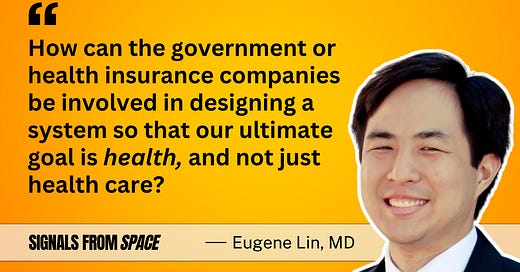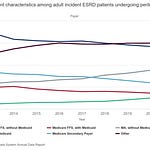Eugene Lin is a nephrologist and health economics researcher who focuses on the impact of public policy and federal regulation on kidney care, the provision of dialysis in public and private insurance markets, and transitions of care for patients with kidney disease. He currently serves as an Assistant Professor of Medicine at the University of Southern California (USC). Eugene's research has been featured in high-impact publications such as JAMA, JAMA Internal Medicine, and Health Affairs. His expertise lies in analyzing how value-based care models impact the delivery of kidney care and patient outcomes, making him a key voice in the conversation about healthcare reform.
Summary
This is part one of our conversation with Dr. Eugene Lin, a nephrologist and health economics researcher, to explore the concept of value-based care. The discussion begins with Eugene’s definition of value-based care, emphasizing its role in aligning financial incentives for healthcare providers with patient outcomes. Eugene highlights the importance of understanding various models of value-based care and the necessity for both providers and patients to be informed about its implications. Our conversation underscores the current relevance of value-based care in the context of rising healthcare costs and the growing, urgent need for improved ESRD outcomes.
Keywords
value-based care, healthcare policy, kidney health, patient outcomes, health economics, healthcare costs, nephrology, healthcare delivery, insurance models, health improvement
Takeaways
Value-Based Care Basics: Value-based care is a payment model that incentivizes providers to deliver high-quality, cost-effective care while penalizing low-value care. It’s designed to align healthcare delivery with financial risk management for insurance companies and the government.
Different Models of Value-Based Care: There are numerous variations of value-based care models, each with its own approach. Some models have successfully improved outcomes and reduced costs, while others have not. The effectiveness of each model depends on its design.
Patient Awareness of Value-Based Care: It’s important for providers to help patients understand value-based care. Healthcare is more than a series of transactions—it’s about improving patient health. Patients should be aware that the goal is optimal health, not just providing services.
The Role of Providers in Value-Based Care: Providers play a key role in guiding patients through value-based care. By working together as a team, doctors, nurses, and other healthcare professionals can ensure that the focus is on improving health outcomes rather than just delivering services.
The Rising Costs of Healthcare: Healthcare spending in the U.S. continues to rise, despite trillions of dollars being spent annually. This trend underscores the need for value-based care to achieve better outcomes without increasing costs.
Chapters
00:00 Introduction and Overview
01:19 Defining Value-Based Care
04:21 The Need for Value-Based Care
05:37 Patient Understanding of Value-Based Care
07:14 Shifting Focus to Health Outcomes
Discussion Topics
How do you think value-based care can improve CKD & ESKD patient outcomes while controlling healthcare costs?
What are the challenges of implementing value-based care models in different healthcare settings?
Should patients be more involved in understanding value-based care, and how can providers better communicate its goals to them?
How can healthcare systems ensure that value-based care models are designed effectively to achieve the best outcomes?
What role should the government and insurance companies play in supporting value-based care innovations?
![Signals From [Space]](https://substackcdn.com/image/fetch/w_80,h_80,c_fill,f_auto,q_auto:good,fl_progressive:steep,g_auto/https%3A%2F%2Fsubstack-post-media.s3.amazonaws.com%2Fpublic%2Fimages%2F55686857-6b99-45a6-ac0f-09c9f023f2a0_500x500.png)
![Signals From [Space]](https://substackcdn.com/image/fetch/e_trim:10:white/e_trim:10:transparent/h_72,c_limit,f_auto,q_auto:good,fl_progressive:steep/https%3A%2F%2Fsubstack-post-media.s3.amazonaws.com%2Fpublic%2Fimages%2F4d588ac1-7fac-4bd4-829d-fc7b4e8f1326_1512x288.png)

![Signals From [Space]](https://substackcdn.com/image/fetch/w_36,h_36,c_fill,f_auto,q_auto:good,fl_progressive:steep,g_auto/https%3A%2F%2Fsubstack-post-media.s3.amazonaws.com%2Fpublic%2Fimages%2F55686857-6b99-45a6-ac0f-09c9f023f2a0_500x500.png)














Share this post